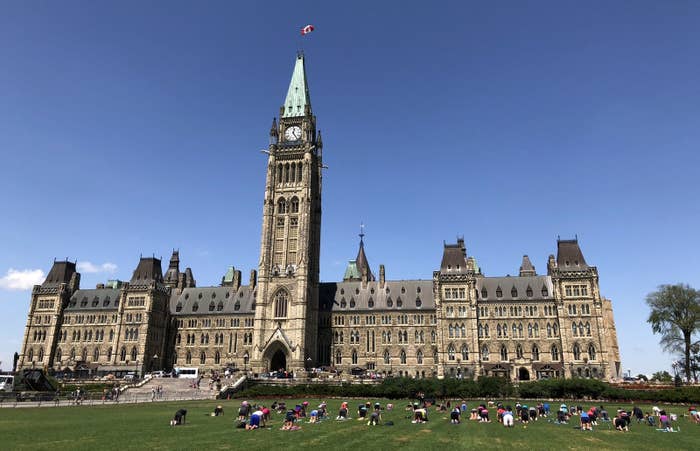
Canadian intelligence agencies have identified persistent foreign state-backed cyber campaigns against government and civilian targets that have some officials worried efforts to interfere with this year’s federal election have already begun.
Two intelligence sources with direct knowledge of efforts to safeguard Canada’s 2019 election say the rate of cyber attacks against federal institutions, political parties and private companies has been steadily increasing.
Between 2013 and 2015, an average of 2,500 state-sponsored “cyber activities” against government networks were detected each year. The rate of success of those activities declined over that period, from six per cent in 2013 to two per cent in 2015 — but that still works out to one successful attack per week.
The government officials, who requested anonymity to speak about ongoing national security matters, said just because a hostile state have political and government systems targets does not necessarily mean they intend to disrupt the election.
But others are treating it as a foregone conclusion.
Foreign interference is “a ‘when’ and not an ‘if,’” said commissioner of Canada Elections Yves Côté in an interview Tuesday with BuzzFeed News and The Star.
Some of Canada’s closest international allies have been the targets of what were believed to be state-sponsored hacking campaigns for years.
Since 2016, elections in those countries have also been the targets of widely-publicized hacking, misinformation and influence operations by hostile foreign powers. Officials in Canada expect the 2019 election will be no different.
Côté’s office investigates violations of Canadian elections law. He said intelligence agencies, government departments and law enforcement, as well as arm’s-length offices like Elections Canada and his own, are working together to mitigate the risk.
But he was also frank about their chances of completely countering the threat.
“(We) are taking this very seriously. That doesn’t mean that we can prevent everything,” Côté said. “That means that as much as something can be prevented, the steps that have to be taken will be (taken) to avoid these things happening.”
The Communications Security Establishment (CSE), Canada’s electronic spying and cyber defence agency, has said it expects the coming election to be the target of cyber attacks from a variety of sources. The agency has not yet said that hostile nation states will attempt to influence the campaign.
The United States, the UK, France, Germany, and most recently Australia have all faced politically motivated hacking and misinformation campaigns during recent elections. Stolen documents have been strategically released, existing divisions within societies inflamed, and straight-up misinformation pushed out and presented as legitimate reporting.
A day before the French went to the polls to ultimately elect Emmanuel Macron in 2017, a leak of more than 20,000 documents about the then-candidate was spread across social media. The leak was widely attributed to Russia. In Germany, Russian bots were boosting messages from the far-right AfD party in what one bot operator said was a “mutually beneficial” relationship. Russian interventions in the 2016 US presidential campaign and the UK’s Brexit referendum have been widely reported.
CSE has completed a report on specific threats it believes Canada will face in the election, but has not yet publicly released it.
BuzzFeed News and The Star and have learned that CSE briefed the major federal parties on the Australian parliamentary hack in February. Australian news outlets have suggested that China, one of the world’s dominant cyber powers, may have been behind the operation. Beijing has rejected those claims as “baseless.”
Hackers targeted not only the Australian Parliament, but also political parties, which are seen both in Australia and Canada as much easier targets than official government networks. They also proved to be one of the weak links exploited by Russian hackers during the 2016 US presidential election.
Canada has recently drawn negative attention from China over the arrest of Huawei executive Meng Wanzhou. The country recently banned imports of canola from Canada.
Russia has been critical of Canada for passing 2017’s Magnitsky Act, which was named for a Russian accountant who died in jail after a politically motivated arrest. The law places economic sanctions on corrupt officials. After it was passed, Russian Foreign Ministry spokesperson Maria Zakharova said, “Any anti-Russian actions by the Canadian authorities will not be left without an adequate response.”
In a statement, CSE said it could not comment on specific “cybersecurity or operational matters.”
“The government of Canada is continuously monitoring to detect any attempts by foreign actors to influence Canada’s 2019 general election,” agency spokesperson Ryan Foreman said in a written statement Wednesday.
“CSE will continue to work with our national security and intelligence partners to mitigate any malicious cyber activity. We are also working closely with our international allies and partners to share information on election security.”
In two recent appearances before the House of Commons’ justice committee, outgoing Clerk of the Privy Council Michael Wernick repeatedly mentioned he had high-level security clearance and was seriously concerned about the threat of foreign interference in the upcoming election.
The comments puzzled MPs and observers, given he was there to discuss his role in the ongoing SNC-Lavalin affair. But Wernick, in addition to being the country’s top bureaucrat and having access to Canada’s most sensitive intelligence, was a member of the five-person panel that will decide whether or not to inform Canadians of foreign intervention in the election.
When asked if Wernick was warning that government agencies have already detected a threat or threats to the integrity of the election, a senior official would say only that clerks of the Privy Council are “typically very well informed.”
The Star and BuzzFeed News are investigating the ways political parties, third-party pressure groups, foreign powers and individuals are influencing Canada’s political debate in the run-up to this fall’s federal election.



